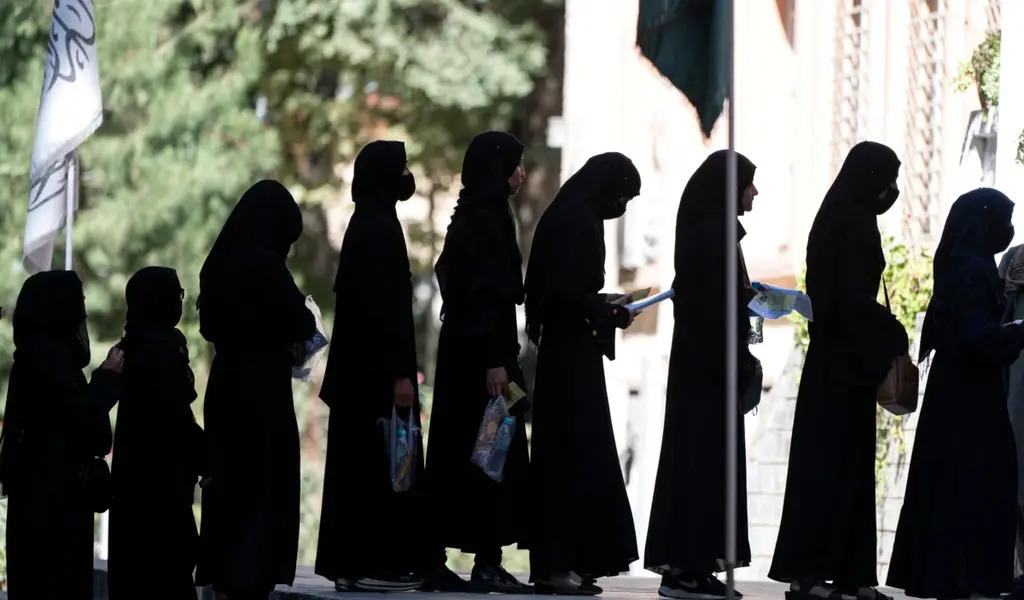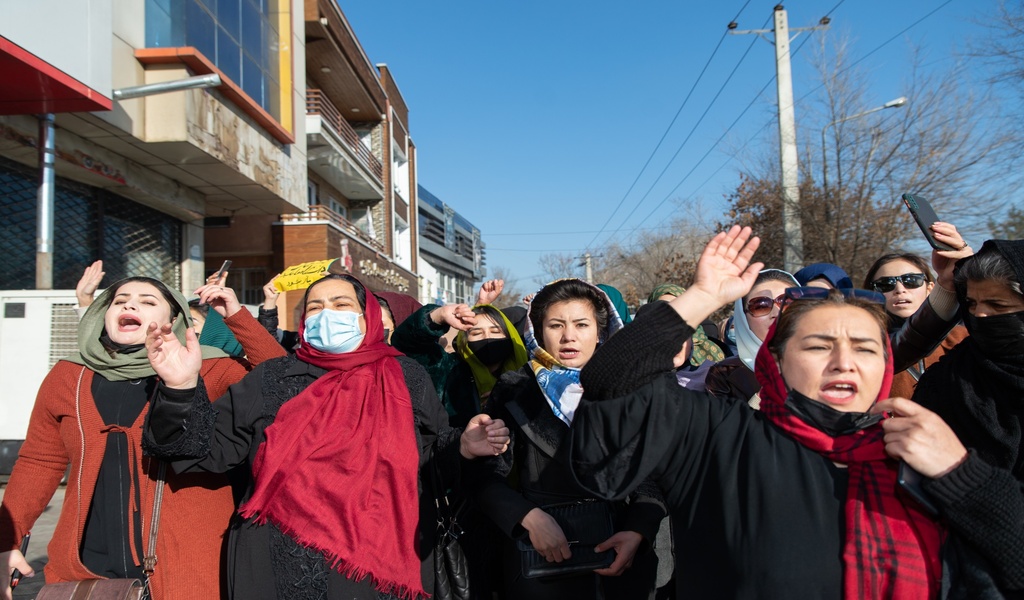News
Taliban Leaders Display Rare Public Division Over Bans

(CTN NEWS) – Interior Minister Sirajuddin Haqqani, a prominent government official, recently made a statement that was perceived as an implicit criticism of the movement’s reclusive supreme leader, sparking a rare public display of debate within the ranks of Afghanistan’s ruling Taliban.
Since the former militants took over the nation in August 2021, the Taliban leadership has been secretive, giving almost little indication of how decisions are made.
Hibatullah Akhundzada, the organization’s ultimate leader, has seen a bigger role in setting policies in recent months.
He specifically gave the Taliban leadership the order to prohibit girls and women from attending universities and schools after the sixth grade.
The restrictions sparked a major worldwide uproar, deepening Afghanistan’s economic isolation and exacerbating a humanitarian crisis. The restrictions appeared to go against past Taliban government policy as well.

Women had been able to complete their education until the Taliban took power and the prohibition on attending institutions in December.
Taliban authorities have pledged that girls would be permitted to enroll in secondary education, but a plan to reinstate them last year was abruptly overturned.
At a speech over the weekend at a graduation ceremony at an Islamic religious school in the eastern province of Khost, Haqqani made his remarks.
According to his followers’ video recordings of the lecture posted on social media, Haqqani remarked, “Monopolizing power and harming the reputation of the entire system is not to our benefit.”
He continued, “The circumstance cannot be accepted.”
According to Haqqani, “greater responsibility has been placed on our shoulders, and it takes patience, good behavior, and involvement with the people” now that the Taliban are in charge.
According to him, the Taliban must “soothe the people’s wounds” and behave so that the populace does not develop a hatred for them and their religion.

Although Haqqani did not specifically mention Akhundzada, many people who commented on social media took the words to be directed at him.
The topic of women’s education was also left out of Haqqani’s remarks, even though he has previously spoken out in favour of allowing women and girls to attend schools and universities.
As an apparent response to Haqqani’s remarks, the chief spokesman for the Kabul administration, Zabihullah Mujahed, said—without identifying him—that criticism is best expressed in private.
According to Islamic ethics, the speaker stated that someone should criticize the emir, a minister, or any other official in private rather than in front of the public.
The Islamic scholar Akhundzada hardly ever leaves the Taliban stronghold in southern Kandahar province and hardly ever appears in public.
He surrounds himself with religious sages and tribal chiefs against education and feminist causes. There is only one old, known photograph of him.

Image: AP
After the Taliban took power, Akhundzada only once visited Kabul to deliver a lecture to a gathering of pro-Taliban clerics; however, he was not depicted in media coverage of the closed event.
Haqqani’s remarks “are a big escalation,” according to Michael Kugelman, the deputy director of the Asia program and senior associate for South Asia at the Wilson Center. The Taliban have historically dealt with internal conflicts behind closed doors.
The Taliban’s top officials share this broad vision, but, according to Kugelman, “in Kandahar, they’re hermits; they’re not participating in the day-to-day.” He continued, “They have to run Kabul and give services.”
Haqqani is the leader of the Haqqani network, a division of the Taliban organized around the Khost-based Haqqani family.
The network was renowned for attacks on civilians and suicide bombers in Kabul, and it fought against U.S.-led NATO soldiers and previous Afghan government forces for years.

Sirajuddin Haqqani is the subject of a $10 million bounty placed by the American government for assaults on American service members and Afghan civilians.
After twenty years of fighting as insurgents, some senior Taliban have had to quickly adapt to the needs of the government, and his statements highlighted an obvious gap between them.
Taliban officials claimed they desired improved relations with the outside world when they came to power in 2021. When they first came to power in the 1990s, they enforced societal restrictions on women and punishments, including public beatings.
They declared they would not do so again.
Yet in the time since, the Taliban have prohibited women from entering parks, most workplaces, and middle and high schools. Women are also required to appear in public dressed from head to toe.
At a speech this week in Kabul, Abdul Salam Hanafi, the deputy prime minister of the Taliban government, subtly challenged the prohibition on women’s and girls’ education.

We won’t succeed, he declared, “if we don’t increase the amount and quality of education and if we don’t modernize it.”
The obligation of Islamic scholars, he continued, goes beyond outright forbidding a habit or behavior; they also have to provide a resolution and a way forward.
Veteran writer Ahmed Rashid, who has written numerous books about the Taliban and is based in Lahore, said he didn’t anticipate any change from Akhundzada and his backers in Kandahar.
Rashid asserted that there is unlikely to be “any form of the uprising” among the ranks since the Taliban value unity in facing challenges from NATO and the United States.
But, he claimed that those in the Taliban leadership who are faced with the weight of the state have “realized they can’t continue like this.”
RELATED CTN NEWS:
U.S. Response To Chinese Balloon Invasion Slammed By China
Seoul Reverses Gender Policy By Removing Women-Only Parking Spaces

News
Google’s Search Dominance Is Unwinding, But Still Accounting 48% Search Revenue

Google is so closely associated with its key product that its name is a verb that signifies “search.” However, Google’s dominance in that sector is dwindling.
According to eMarketer, Google will lose control of the US search industry for the first time in decades next year.
Google will remain the dominant search player, accounting for 48% of American search advertising revenue. And, remarkably, Google is still increasing its sales in the field, despite being the dominating player in search since the early days of the George W. Bush administration. However, Amazon is growing at a quicker rate.
Google’s Search Dominance Is Unwinding
Amazon will hold over a quarter of US search ad dollars next year, rising to 27% by 2026, while Google will fall even more, according to eMarketer.
The Wall Street Journal was first to report on the forecast.
Lest you think you’ll have to switch to Bing or Yahoo, this isn’t the end of Google or anything really near.
Google is the fourth-most valued public firm in the world. Its market worth is $2.1 trillion, trailing just Apple, Microsoft, and the AI chip darling Nvidia. It also maintains its dominance in other industries, such as display advertisements, where it dominates alongside Facebook’s parent firm Meta, and video ads on YouTube.
To put those “other” firms in context, each is worth more than Delta Air Lines’ total market value. So, yeah, Google is not going anywhere.
Nonetheless, Google faces numerous dangers to its operations, particularly from antitrust regulators.
On Monday, a federal judge in San Francisco ruled that Google must open up its Google Play Store to competitors, dealing a significant blow to the firm in its long-running battle with Fortnite creator Epic Games. Google announced that it would appeal the verdict.
In August, a federal judge ruled that Google has an illegal monopoly on search. That verdict could lead to the dissolution of the company’s search operation. Another antitrust lawsuit filed last month accuses Google of abusing its dominance in the online advertising business.
Meanwhile, European regulators have compelled Google to follow tough new standards, which have resulted in multiple $1 billion-plus fines.

Pixa Bay
Google’s Search Dominance Is Unwinding
On top of that, the marketplace is becoming more difficult on its own.
TikTok, the fastest-growing social network, is expanding into the search market. And Amazon has accomplished something few other digital titans have done to date: it has established a habit.
When you want to buy anything, you usually go to Amazon, not Google. Amazon then buys adverts to push companies’ products to the top of your search results, increasing sales and earning Amazon a greater portion of the revenue. According to eMarketer, it is expected to generate $27.8 billion in search revenue in the United States next year, trailing only Google’s $62.9 billion total.
And then there’s AI, the technology that (supposedly) will change everything.
Why search in stilted language for “kendall jenner why bad bunny breakup” or “police moving violation driver rights no stop sign” when you can just ask OpenAI’s ChatGPT, “What’s going on with Kendall Jenner and Bad Bunny?” in “I need help fighting a moving violation involving a stop sign that wasn’t visible.” Google is working on exactly this technology with its Gemini product, but its success is far from guaranteed, especially with Apple collaborating with OpenAI and other businesses rapidly joining the market.
A Google spokeswoman referred to a blog post from last week in which the company unveiled ads in its AI overviews (the AI-generated text that appears at the top of search results). It’s Google’s way of expressing its ability to profit on a changing marketplace while retaining its business, even as its consumers steadily transition to ask-and-answer AI and away from search.

Google has long used a single catchphrase to defend itself against opponents who claim it is a monopoly abusing its power: competition is only a click away. Until recently, that seemed comically obtuse. Really? We are going to switch to Bing? Or Duck Duck Go? Give me a break.
But today, it feels more like reality.
Google is in no danger of disappearing. However, every highly dominating company faces some type of reckoning over time. GE, a Dow mainstay for more than a century, was broken up last year and is now a shell of its previous dominance. Sears declared bankruptcy in 2022 and is virtually out of business. US Steel, long the foundation of American manufacturing, is attempting to sell itself to a Japanese corporation.
SOURCE | CNN
News
2024 | Supreme Court Won’t Hear Appeal From Elon Musk’s X Platform Over Warrant In Trump Case

Washington — Trump Media, The Supreme Court announced Monday that it will not hear an appeal from social media platform X about a search warrant acquired by prosecutors in the election meddling case against former President Donald Trump.
The justices did not explain their rationale, and there were no recorded dissents.
The firm, which was known as Twitter before being purchased by billionaire Elon Musk, claims a nondisclosure order that prevented it from informing Trump about the warrant obtained by special counsel Jack Smith’s team violated its First Amendment rights.
The business also claims Trump should have had an opportunity to exercise executive privilege. If not reined in, the government may employ similar tactics to intercept additional privileged communications, their lawyers contended.
Supreme Court Won’t Hear Appeal From Elon Musk’s X Platform Over Warrant In Trump Case
Two neutral electronic privacy groups also joined in, urging the high court to hear the case on First Amendment grounds.
Prosecutors, however, claim that the corporation never shown that Trump utilized the account for official purposes, therefore executive privilege is not a problem. A lower court also determined that informing Trump could have compromised the current probe.

Trump utilized his Twitter account in the weeks preceding up to his supporters’ attack on the Capitol on January 6, 2021, to spread false assertions about the election, which prosecutors claim were intended to create doubt in the democratic process.
The indictment describes how Trump used his Twitter account to encourage his followers to travel to Washington on Jan. 6, pressuring Vice President Mike Pence to reject the certification, and falsely claiming that the Capitol crowd, which battered police officers and destroyed glass, was peaceful.
Supreme Court Won’t Hear Appeal From Elon Musk’s X Platform Over Warrant In Trump Case
That case is now moving forward following the Supreme Court’s verdict in July, which granted Trump full immunity from criminal prosecution as a former president.
The warrant arrived at Twitter amid quick changes implemented by Musk, who bought the company in 2022 and has since cut off most of its workforce, including those dedicated to combating disinformation and hate speech.
SOURCE | AP
News
The Supreme Court Turns Down Biden’s Government Appeal in a Texas Emergency Abortion Matter.

(VOR News) – A ruling that prohibits emergency abortions that contravene the Supreme Court law in the state of Texas, which has one of the most stringent abortion restrictions in the country, has been upheld by the Supreme Court of the United States. The United States Supreme Court upheld this decision.
The justices did not provide any specifics regarding the underlying reasons for their decision to uphold an order from a lower court that declared hospitals cannot be legally obligated to administer abortions if doing so would violate the law in the state of Texas.
Institutions are not required to perform abortions, as stipulated in the decree. The common populace did not investigate any opposing viewpoints. The decision was made just weeks before a presidential election that brought abortion to the forefront of the political agenda.
This decision follows the 2022 Supreme Court ruling that ended abortion nationwide.
In response to a request from the administration of Vice President Joe Biden to overturn the lower court’s decision, the justices expressed their disapproval.
The government contends that hospitals are obligated to perform abortions in compliance with federal legislation when the health or life of an expectant patient is in an exceedingly precarious condition.
This is the case in regions where the procedure is prohibited. The difficulty hospitals in Texas and other states are experiencing in determining whether or not routine care could be in violation of stringent state laws that prohibit abortion has resulted in an increase in the number of complaints concerning pregnant women who are experiencing medical distress being turned away from emergency rooms.
The administration cited the Supreme Court’s ruling in a case that bore a striking resemblance to the one that was presented to it in Idaho at the beginning of the year. The justices took a limited decision in that case to allow the continuation of emergency abortions without interruption while a lawsuit was still being heard.
In contrast, Texas has been a vocal proponent of the injunction’s continued enforcement. Texas has argued that its circumstances are distinct from those of Idaho, as the state does have an exemption for situations that pose a significant hazard to the health of an expectant patient.
According to the state, the discrepancy is the result of this exemption. The state of Idaho had a provision that safeguarded a woman’s life when the issue was first broached; however, it did not include protection for her health.
Certified medical practitioners are not obligated to wait until a woman’s life is in imminent peril before they are legally permitted to perform an abortion, as determined by the state supreme court.
The state of Texas highlighted this to the Supreme Court.
Nevertheless, medical professionals have criticized the Texas statute as being perilously ambiguous, and a medical board has declined to provide a list of all the disorders that are eligible for an exception. Furthermore, the statute has been criticized for its hazardous ambiguity.
For an extended period, termination of pregnancies has been a standard procedure in medical treatment for individuals who have been experiencing significant issues. It is implemented in this manner to prevent catastrophic outcomes, such as sepsis, organ failure, and other severe scenarios.
Nevertheless, medical professionals and hospitals in Texas and other states with strict abortion laws have noted that it is uncertain whether or not these terminations could be in violation of abortion prohibitions that include the possibility of a prison sentence. This is the case in regions where abortion prohibitions are exceedingly restrictive.
Following the Supreme Court’s decision to overturn Roe v. Wade, which resulted in restrictions on the rights of women to have abortions in several Republican-ruled states, the Texas case was revisited in 2022.
As per the orders that were disclosed by the administration of Vice President Joe Biden, hospitals are still required to provide abortions in cases that are classified as dire emergency.
As stipulated in a piece of health care legislation, the majority of hospitals are obligated to provide medical assistance to patients who are experiencing medical distress. This is in accordance with the law.
The state of Texas maintained that hospitals should not be obligated to provide abortions throughout the litigation, as doing so would violate the state’s constitutional prohibition on abortions. In its January judgment, the 5th United States Circuit Court of Appeals concurred with the state and acknowledged that the administration had exceeded its authority.
SOURCE: AP
SEE ALSO:
Could Last-Minute Surprises Derail Kamala Harris’ Campaign? “Nostradamus” Explains the US Poll.
-

 News4 years ago
News4 years agoLet’s Know About Ultra High Net Worth Individual
-
Entertainment3 years ago
Mabelle Prior: The Voice of Hope, Resilience, and Diversity Inspiring Generations
-
News11 years ago
Enviromental Groups Tell Mekong Leaders Lao Dam Evaluation Process Flawed
-

 Health4 years ago
Health4 years agoHow Much Ivermectin Should You Take?
-

 Tech3 years ago
Tech3 years agoTop Forex Brokers of 2023: Reviews and Analysis for Successful Trading
-

 Lifestyles3 years ago
Lifestyles3 years agoAries Soulmate Signs
-

 Entertainment3 years ago
Entertainment3 years agoWhat Should I Do If Disney Plus Keeps Logging Me Out of TV?
-

 Health4 years ago
Health4 years agoCan I Buy Ivermectin Without A Prescription in the USA?


